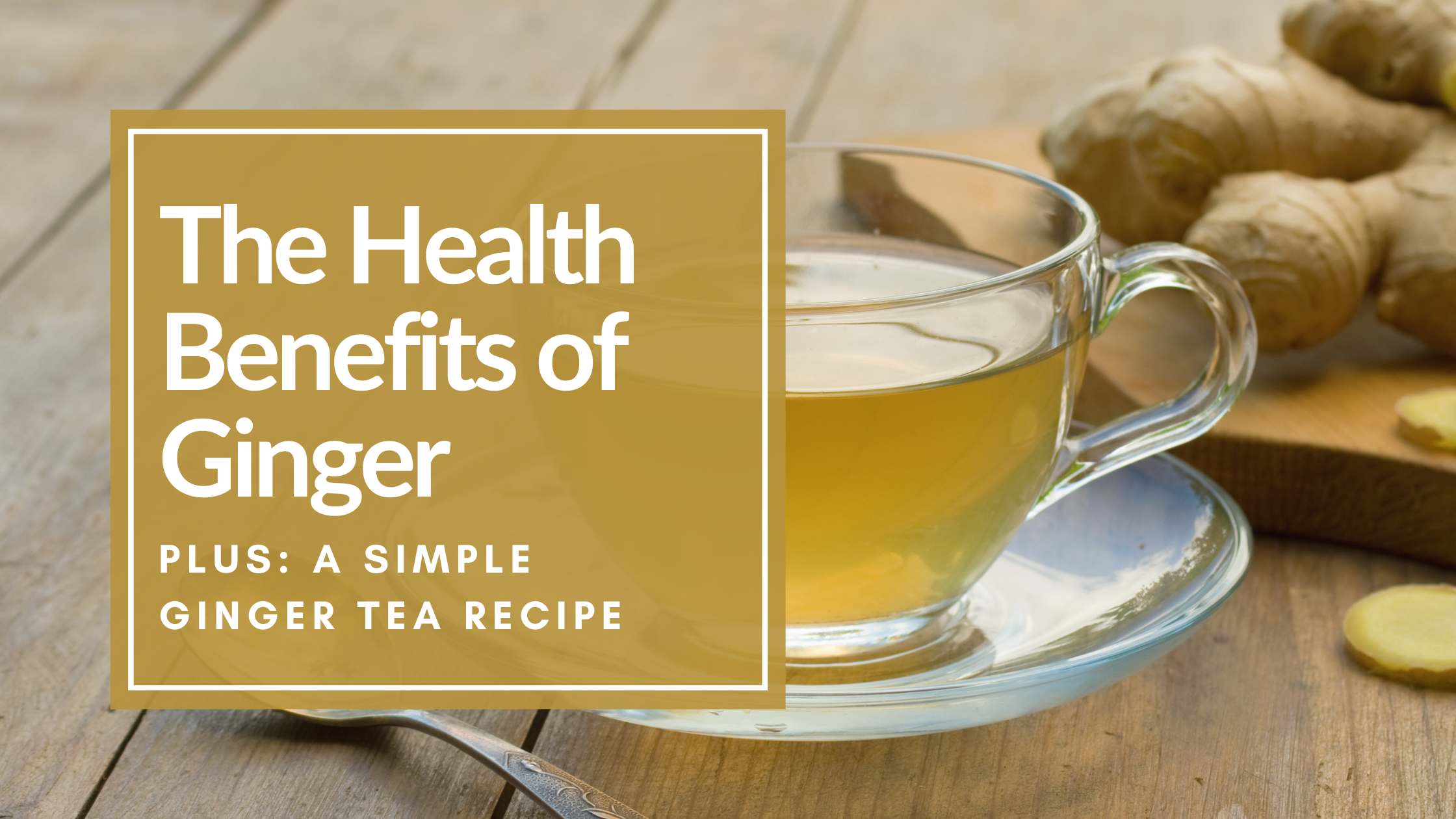
Discover how ginger can boost health, including fresh ginger tea benefits and a simple recipe.
Ginger has a popular place in the kitchen and in supplements because the health benefits of ginger are backed by science. Ginger can be used cooked or raw, put in teas and supplements, and it fits into many different types of cuisines, making it one of the best multi-use holistic remedies.
Some types of ginger have their place in the garden because there are many different types of flowering ginger. However, that’s not the type of ginger we talk about when referencing the healing benefits of ginger. We’re talking about Zingiber Officianale, which is the ginger you eat, as well as the ginger that has medicinal plant properties.
Ginger has been used for thousands of years for both culinary and medicinal purposes. The root is the part that holds ginger benefits and uses. The ginger root is really a rhizome, and there is a difference between the two. Roots take in nutrients, whereas a rhizome is like an anchor and holds nutrients. It has a pungent, spicy flavor and is often used in Asian, Indian, and Middle Eastern cuisine.
Ginger has also been used in traditional herbal remedies to address everyday discomforts and for when there could be a dietary sensitivity.
The use of ginger can be traced back to ancient times. It was highly prized by the Romans, who imported it from India and used it as a spice and medicine. In medieval Europe, ginger was used for many things, ranging from stomach aches to the plague. During the 16th century, ginger became an important commodity in the spice trade and was highly sought after by European traders for everything from fresh ginger tea benefits to its refreshing smell.
What Are the Health Benefits of Ginger?
Ginger’s benefits and uses have been studied and documented by modern science. One of the most well-known benefits of ginger is its ability to aid in digestion. Ginger has been shown to help relieve nausea and vomiting, as well as other digestive issues like bloating and gas. Ginger also provides antioxidants, which are beneficial to your liver’s detoxification processes, and anti-inflammatory properties.
One of the health benefits of ginger is its anti-inflammatory properties, which can help reduce pain and swelling in the body. This makes it a popular choice for those with issues like arthritis or other inflammatory conditions, who drink fresh ginger tea for benefits, or take supplements.
What are Ginger’s Benefits and Uses with Digestion, Inflammation, and Nausea?
Ginger contains compounds called gingerols and shogaols, which are responsible for many of the health benefits. These compounds have been shown to have anti-inflammatory and antioxidant properties, which can help reduce inflammation in the body and protect against damage from free radicals. These compounds are also very supportive of your immune system.
Ginger’s benefits and uses for digestion are vast. Ginger has been shown to stimulate the production of digestive enzymes and bile, which can help to break down food and improve nutrient absorption. This can help reduce symptoms like bloating, gas, and constipation related to a dietary sensitivity or other issues.
Ginger has also been shown to have a calming effect on the digestive system, which can help reduce nausea and vomiting. This makes it a popular choice for those undergoing chemotherapy or suffering from motion sickness.
Another of ginger’s benefits and uses is it has been shown to decrease parasites. One of the common resonating parasites we see on our Bioresonance Testing results is the parasite Giardia. Giardia is a common microbe that affects the gut. The common worry about a parasite like Giardia is that it can affect the intestinal villi or the convolutions of the gut wall. It also, like other parasites, impacts nutrient absorption. Something like fresh ginger tea benefits those struggling with Giardia as a natural way to combat the issue.
Using Ginger for Hair and Skin
In addition to its digestive and anti-inflammatory aid, ginger’s benefits and uses include for skin and hair. Ginger contains antioxidants that can help protect the skin from damage and signs of aging. It also has anti-inflammatory properties that can help reduce redness and swelling.
Ginger can be used topically on the skin as a natural remedy for acne or other skin conditions. It can also be used as a hair treatment to help improve scalp health and promote hair growth.

How to Use Ginger in Cooking and Recipes
You can easily access many ginger benefits and uses in cooking. Ginger can be used in a variety of ways in many recipes. It is often used in Asian, Indian, and Middle Eastern cuisine to add flavor and spice to dishes. It can be used fresh, dried, or powdered.
Fresh ginger can be peeled, grated, or minced to add to dishes like stir-fry or soup. Dried ginger can be used in baking or added to spice blends. Ginger powder can be used to make tea or added to smoothies. Ginger is also used in Fire Cider, a popular drink that is said to ward off the common cold and can be a great natural flu remedy.
Ginger Tea Recipe and Its Benefits
Fresh ginger tea’s benefits are vast, especially when it comes to fighting illness. Ginger tea is easy to make and can be enjoyed hot or cold. It’s also been shown to have a variety of health benefits, including aiding digestion, reducing inflammation, and boosting the immune system to fight illness.
How to Make Ginger Tea Step-by-Step
Ginger benefits and uses are great and easy to access with tea. To make a simple ginger tea, you will need:
- 1-2 inches of fresh ginger root
- 4 cups of water
- Honey (optional)
- Peel and slice the ginger root into thin pieces.
- Bring the water to a boil in a pot.
- Add the ginger slices to the boiling water.
- Reduce the heat and let the ginger simmer for 10-15 minutes.
- Strain the ginger tea into a cup.
- Add honey to taste (optional).
Variations of Ginger Tea
There are many variations of ginger tea that you can try to suit your taste preferences and health needs. Here are a few ideas:
- Lemon ginger tea: Add a slice of lemon to your ginger tea for a refreshing twist.
- Turmeric ginger tea: Add a pinch of turmeric, or a bit of the grated root, to your ginger tea for an extra anti-inflammatory boost.
- Cinnamon-ginger tea: Skip the honey and add a cinnamon stick or a few cloves for a warm, comforting drink.
Precautions to Take When Seeking Ginger’s Benefits and Uses
While ginger is generally considered safe for most people, everyone has a different energetic sensitivity, and there are some precautions to take when using it. Ginger can interact with some medications, so it is essential to do your research and ask a licensed practitioner before using ginger if you are taking any prescription medications.
Ginger can also cause stomach upset in some people, especially if taken in large amounts. If you experience stomach pain or discomfort after taking ginger, reduce your intake or stop using it altogether.
What Body System Would Ginger Benefit?
While the obvious system for ginger benefits and uses is the Digestive System, just cooking with the warm, spicy flavor of ginger would benefit your mental health and Nervous System, too! Your Immune System and Integumentary System (hair, skin, and nails) will also benefit from fresh ginger tea.
Not sure if ginger would work energetically well for you? Try an energetic Sensitivity Scan and find out!
*This information is for educational purposes only and is not to be interpreted as medical advice.
